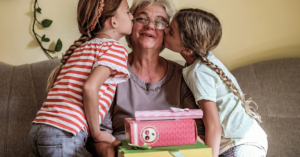Providing Compassionate Person-Centred Care At The Time Of COVID-19
How do you provide compassionate person-centred care for someone affected by dementia…who is recovering from COVID-19 or who is in isolation?
First off, it’s highly important that all caregivers follow the healthcare guidelines set by our Public Health Officers and the company you work with. However, when caring for anyone affected by dementia who has also contracted the COVID-19 virus, things can definitely become a little more complex.
Be aware that the person with dementia may also be experiencing delirium…so they may be exhibiting a further change such as a decline in their current abilities. Keep in mind delirium could be caused not only by a fever but also by pain; dehydration; medications and other infections such as a urinary tract infection (UTI).
Compassion is putting ourselves in another person’s shoes so much so that we really try to feel what it must be like for them. In doing so, it increases our desire to help. When a person is affected by dementia, let’s put ourselves in their shoes and consider some of the challenges and symptoms they may be going through. These may likely include:
- poor memory;
- thinking inabilities;
- poor judgement and reasoning skills;
- communication impairment; and,
- changes in their personality.
What Can You Do?
Below are some practical suggestions that you can use to help you connect and show more compassion during this difficult time.
Understand their strengths and weaknesses.
When you get to know the person, you will be better able to provide the right compassionate care that is person-centred. Find out their likes; dislikes; their cognitive abilities such as their memory and communication abilities.
For example, it would be ideal to adapt your way of communicating to best suit their needs. If the person is not able to properly understand you, it can add to their anxieties. Here are some tips for effective communication:
- Speak one sentence at a time.
- By speaking more slowly and pronouncing all your words
- If they’re hard of hearing, you can speak up or make sure their hearing device is working.
- Use hand gestures to help them understand what you are trying to communicate.
- Write down all your messages for them to read if they can’t hear properly. Writing in large print if they have some visual impairment.
Provide constant reminders.
Doing so will help them with their memory challenges. Reminders can be done verbally but it is even more helpful to have them written on paper where they can see the note at all times.
Reminders should include:
- The importance of being isolated;
- Why they are sick in the first place;
- The need to wear a face mask; etc.
However, if they are NOT able to come into our present reality and they become too panicked about the situation going on in the world we may need to give them some Therapeutic Reasoning™. For example, we may need to say, ”You just have a little flu bug that can get others really sick right now, including your family. We know how much you love your spouse and grandchildren so it’s best we keep you away from everyone until you are back to good health…which shouldn’t be too much longer. We will check to see how you’re doing in the morning.”
Offer lots of reassurance.
For example, you can say and/or write notes to address the concerns they are often talking about. For example:
- “You will be fine.”
- “I’ll be taking good care of you.”
- “I won’t be far.”
- “I’ll be back to check on you shortly.”
- “You will be going home soon.”
Offer them some non-medical care.
A person’s mental health is just as important as helping them through a physical health crisis. When a person is feeling better although still needing to be in isolation, perhaps offer them some activities of interest. Here are some things you can offer them to keep busy if they are able: (Be sure to match to their abilities)
- Help the person to connect with family/friends over the phone, or virtually through a smartphone or tablet using special Apps like Facetime; Messenger; Zoom; WhatsApp etc.
- Provide some of their favourite music to listen to. (i.e. Head phones and an iPod or a TV station with music or radio with no commercials.)
- Put on fun old movies to take their mind off their fears.
- Provide them with a book or magazine to read and/or look through.
- Provide them with their spiritual items such as books, the bible, prayer beads, etc.
- A colouring book with colouring pencils or markers. (Check out this special one for older adults affected by dementia!)
- Offer them a notepad to write a letter or to draw.
- Provide a Word Search or Crossword book for those with higher cognitive abilities
- Encourage exercises in a chair or in their bed. (Can use a video for them to follow or encourage them to do stretches with you in their room but from a distance while following proper precautions.)
Environmental consideration
Look around the room to see what could or is currently causing frustration or agitation. Here are some items you may want to change or consider:
- Place wall signs to explain where they can find the washroom to help with independence and wayfinding.
- Be sure the room is well lit when they are up trying to do something.
- Familiar items should be close by to provide some comfort such as pictures or notes from their family members.
- Try to make sure they are feeling comfortable temperature-wise. Maybe another blanket could make a positive difference for them.
- Try to keep the noise levels non-disruptive to avoid agitation and/or aggression.
- Take away any items in the room that are causing them agitation.
You Are Important!
These are just a few ideas and reminders on how we could ideally support someone with dementia during this difficult time. However, being compassionate can only be done when we are healthy. So please take good care of yourself so that you can make a positive difference in the lives of others!
I think we all would agree that YOU deserve excellent health! You are needed. You are precious and appreciated! The person you’re caring for really needs you right now.
We wish you strength, a positive mindset and of course good health. We will get through this! We welcome you to join our new Facebook groups!
We have two specialized groups:
- Professional Paid Caregivers (PSW’s; HCA’s; LPN’s; RN’s; PN’s; Doctors; Social Workers; Recreation Professionals) Facebook Group for Professionals
- Family Caregivers (All family members and friends). Facebook Group for Families
Feel free to contact us with any questions or additional ideas that can be added to this post. 😊
*This article was Inspired by a post on Facebook posted on March 24, 2020 in response to a question which was answered by Prof. Lydia Manahan, PhD (UP College of Nursing and Gerontology Nurses Association of the Philippines, Inc)



